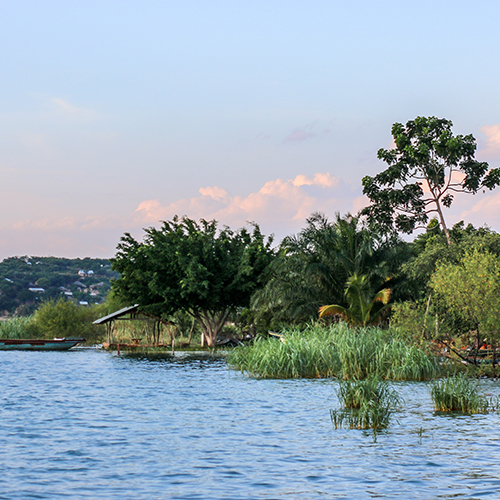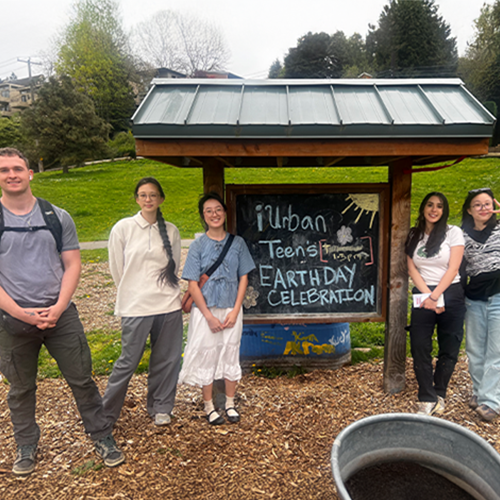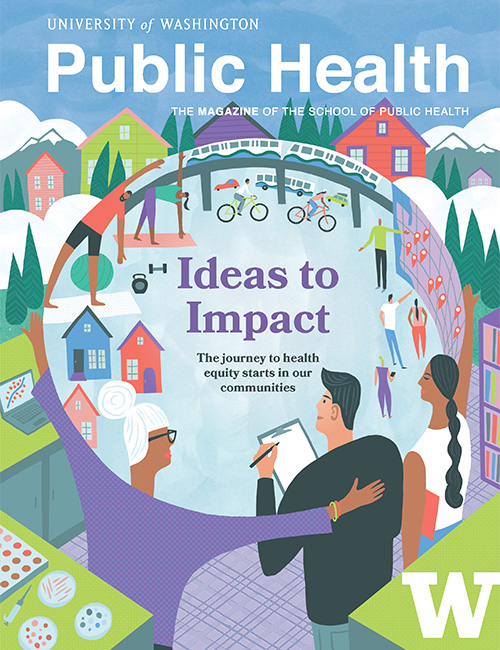FLARE extracts complex genetic data
 University of Washington researchers have developed FLARE (Fast Local Ancestry Estimation), a new method that advances genetic research in admixed populations. Admixed individuals, whose genomes are shaped by multiple ancestral groups, provide a unique opportunity to identify disease-causing genes through local ancestry analysis. Until now, no computational methods could robustly handle the massive data now available for such analyses.
University of Washington researchers have developed FLARE (Fast Local Ancestry Estimation), a new method that advances genetic research in admixed populations. Admixed individuals, whose genomes are shaped by multiple ancestral groups, provide a unique opportunity to identify disease-causing genes through local ancestry analysis. Until now, no computational methods could robustly handle the massive data now available for such analyses.
Detailed in the American Journal of Human Genetics, FLARE overcomes this challenge by enabling precise local ancestry inference for whole genome sequences containing hundreds of millions of genetic variants. “Existing tools couldn't scale to the growing amounts of genetic data,” says lead researcher Sharon Browning, professor of UW biostatistics. FLARE’s innovative approach leverages techniques from previous large-scale studies but can analyze greater amounts of data with reduced computation time to more accurately map ancestry at each genomic location.
The team prioritizes accessibility, providing comprehensive documentation and ongoing support for researchers worldwide using this cutting-edge tool. Currently, FLARE is being used in the Hispanic Community Health Study to investigate genetic links to diseases like kidney disease, and in the Africa6K project to explore population histories.
Improving TB care in rural Zambia
 In Mpulungu, a remote area in northern Zambia, tuberculosis (TB) testing often requires patients to travel by canoe to the nearest clinic. For many, health services are accessible only by boat, leading to delays in diagnosis and treatment, worsening patients' conditions. Zambia faces high mortality rates among TB patients, particularly in rural areas where three out of four people succumb within the first month of treatment.
In Mpulungu, a remote area in northern Zambia, tuberculosis (TB) testing often requires patients to travel by canoe to the nearest clinic. For many, health services are accessible only by boat, leading to delays in diagnosis and treatment, worsening patients' conditions. Zambia faces high mortality rates among TB patients, particularly in rural areas where three out of four people succumb within the first month of treatment.
Operational research (OR) has been an effective approach in addressing health care challenges in these areas. Unlike clinical research, OR focuses on problem-solving within health care systems, leveraging local knowledge. An article authored by Ramya Kumar, an alum of epidemiology, highlights the impact of OR in enhancing Zambia's TB care. Between 2017 and 2021, the Eradicate TB Project trained 36 district health workers, resulting in nine OR studies that informed interventions, improving TB diagnoses, lowering mortality, and streamlining lab processes.
The program’s success demonstrates the importance of multidisciplinary approaches in controlling infectious diseases, with OR providing locally relevant solutions that lead to better patient outcomes and stronger health systems.
BIPOC individuals experience greater post-COVID burdens
 A study published in Frontiers in Public Health reveals that BIPOC individuals who contracted COVID-19 experienced more negative long-term health and work-related impacts than white participants. Kelli O’Laughlin, associate professor of global health and emergency medicine at the University of Washington Schools of Public Health and Medicine, was the UW site-PI of this multi-site study. Researchers tracked 2,402 U.S. participants infected between 2020-2022. They found that BIPOC individuals reported worse health outcomes and greater work loss months after infection, despite experiencing similar initial symptoms.
A study published in Frontiers in Public Health reveals that BIPOC individuals who contracted COVID-19 experienced more negative long-term health and work-related impacts than white participants. Kelli O’Laughlin, associate professor of global health and emergency medicine at the University of Washington Schools of Public Health and Medicine, was the UW site-PI of this multi-site study. Researchers tracked 2,402 U.S. participants infected between 2020-2022. They found that BIPOC individuals reported worse health outcomes and greater work loss months after infection, despite experiencing similar initial symptoms.
Hispanic and “other/multiple race” participants, including American Indian and Pacific Islander groups, were nearly twice as likely to report fair or poor health and reduced activity levels at three months compared to non-Hispanic and white counterparts. Black and “other/multiple race” participants reported significantly higher work loss at six months. Researchers attribute these disparities to socioeconomic factors, inequitable health care access, and institutional racism.
The study, part of the CDC-funded INSPIRE project, aims to inform equitable health interventions for underserved populations still dealing with COVID-19’s aftereffects.
Designing innovative hydroponic farming methods
 The University of Washington School of Public Health's Food Systems, Nutrition, and Health program has partnered with iUrban Teen to explore innovative farming techniques at the Rainier Community Center’s urban garden, located on a former landfill in southeast Seattle. While raised beds are a common solution to growing on contaminated soil, they are exploring hydroponics — a method of growing plants without soil.
The University of Washington School of Public Health's Food Systems, Nutrition, and Health program has partnered with iUrban Teen to explore innovative farming techniques at the Rainier Community Center’s urban garden, located on a former landfill in southeast Seattle. While raised beds are a common solution to growing on contaminated soil, they are exploring hydroponics — a method of growing plants without soil.
Undergraduate students in the UW food systems major are supporting this work through their capstone projects. They designed blueprints for outdoor solar-powered and non-electric hydroponic systems, while also collecting nutrient data for plants that will thrive in these setups. iUrban Teen will use the students' blueprints to seek approval from Seattle Parks and Recreation and hope to implement them in the garden by early 2025.
This joint effort helps support iUrban Teen's goals of growing thousands of pounds of leafy greens and vegetables for their unhoused community neighbors and providing a space for high school-aged youth underrepresented in STEM careers to study environmental and agricultural science.
New center to prepare communities for public health emergencies
 A new regional Northwest Center for Evidence-Based Public Health Emergency Preparedness and Response has been established at the University of Washington (UW) with $978,000 from the Centers for Disease Control and Prevention (CDC) for its first year. Led by the UW Center for Disaster Resilient Communities (CDRC) in partnership with the Northwest Center for Public Health Practice, the new center aims to enhance public health preparedness in Alaska, Idaho, Oregon and Washington. Nicole Errett, associate professor of environmental and occupational health sciences, will serve as the center’s director.
A new regional Northwest Center for Evidence-Based Public Health Emergency Preparedness and Response has been established at the University of Washington (UW) with $978,000 from the Centers for Disease Control and Prevention (CDC) for its first year. Led by the UW Center for Disaster Resilient Communities (CDRC) in partnership with the Northwest Center for Public Health Practice, the new center aims to enhance public health preparedness in Alaska, Idaho, Oregon and Washington. Nicole Errett, associate professor of environmental and occupational health sciences, will serve as the center’s director.
This center is part of a national network of ten regional centers created by the CDC's Office of Readiness and Response to support communities in preparing for public health emergencies. By working with local health departments, hospitals and community organizations, these centers will help implement evidence-based strategies to address public health threats. The UW center will also collaborate with tribes in developing culturally relevant strategies to strengthen the resilience of tribal public health systems.
Launched in 2023, the CDRC brings together more than 100 UW faculty experts from various fields, including public health, environmental science, and medicine, to provide resources and technical support for disaster preparedness. It is supported by the UW Population Health Initiative. Last year, under a CDC contract, the CDRC developed a workplan focused on improving disaster preparedness in the northwest, particularly for tribal communities.
The center’s activities will focus on three main areas, which stem from the CDRC’s workplan: assessing and addressing current capabilities and future risks, communications, and building workforce capacity and leadership.
Key UW School of Public Health faculty involved in the center include Betty Bekemeier, Resham Patel, Tania Busch Isaksen and Jamie Donatuto, each leading projects in training, collaboration, implementation and health equity.
Contraception access for youth in British Columbia
 Sarah Munro, assistant professor at the University of Washington’s Department of Health Systems and Population Health, is leading research to understand the impact of two recent policy changes in British Columbia aimed at increasing contraception access, particularly for youth. Munro, also the co-director of the Contraception & Abortion Research Team, has long focused on improving reproductive health care by removing barriers to contraception and abortion.
Sarah Munro, assistant professor at the University of Washington’s Department of Health Systems and Population Health, is leading research to understand the impact of two recent policy changes in British Columbia aimed at increasing contraception access, particularly for youth. Munro, also the co-director of the Contraception & Abortion Research Team, has long focused on improving reproductive health care by removing barriers to contraception and abortion.
British Columbia’s new policies mark significant strides in reproductive health equity. First, the province now offers all forms of prescription contraception, including pills and intrauterine devices (IUDs), for free, even for those not yet enrolled in Canada’s health care system. Second, pharmacists are now authorized to prescribe contraception, with accompanying training to ensure they are well-equipped to assist patients. These changes are expected to benefit youth, especially those in rural and remote areas who face challenges related to cost, stigma and access.
Munro’s current study builds on her previous work, which included interviewing 79 Canadian youth and 27 health care providers through the Ask Us Project funded by the Canadian government. Her earlier research identified two major barriers for young people seeking contraception: the high cost and the stigma associated with accessing contraception, particularly in close-knit communities where privacy is a concern. Youth in rural areas may struggle with transportation, while those in close-knit urban areas may know their pharmacists personally, further exacerbating confidentiality concerns.
To address these challenges, Munro is investigating how the new policies can support youth to access contraception that matches their preferences. She is conducting interviews with pharmacists and youth in smaller British Columbia communities to assess the effectiveness of the policy changes. Additionally, Munro is exploring ways to improve pharmacist education on contraception, ensuring they are confident in their role as prescribers.
Munro’s research, supported by a grant from the Ministry of Health and UBC Health, aims to generate insights that can inform broader efforts to improve contraception access both in Canada and the U.S.
